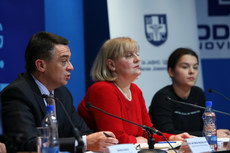- Serbia
Get to know Serbia
- Citizens
Culture and science
Health services
Pension and disability insurance
- Business
Employment
Economy
- Media
- Government
- Contact
Keep in touch
Contact form
Back
Keepin touch
Whether you have a question, comment, suggestion or any problem in the purview of the government, send us your message and we will try to respond as soon as possible. If your problem is not in our purview, we will forward your message to the relevant institution.
Q:
A:
Serbia successful in fighting AIDS
Belgrade,
1 December 2008
Minister of Health Tomica Milosavljevic today stated that Serbia is successfully fighting the AIDS epidemic and will continue to carry out similar campaigns.
At a press conference on the occasion of World AIDS Day, Milosavljevic recalled that Serbia has been implementing the National Strategy for Fighting AIDS since February 2005.
He recalled that in 2006 a national office was set up within the Serbian Public Health Institute to deal with this issue.
According to him, the Ministry of Health is implementing a project to fight AIDS, financed by the Global Fund for HIV, Tuberculosis and Malaria with around €9 million.
Milosavljevic said that the project began in June 2007 and will end in May 2012 and is being carried out in 23 Serbian towns.
Director of the Public Health Institute Tanja Knezevic said that, according to their data, a total of 2,287 HIV positive persons have been registered in Serbia from 1985 until November 20 this year, of which 1,432 now have AIDS and 936 have died.
Knezevic specified that from January 1 to November 20, 2008, 87 HIV positive persons were registered, out of which 34 have been infected with AIDS and 16 died.
She pointed out that two thirds of HIV positive persons are male, 87% have been infected through sexual intercourse, 11% by using an infected person’s needle and in one case the mother transmitted the virus to her baby.
According to her, although the number of registered cases is small, the epidemiological situation in Serbia is potentially dangerous, considering the social and economic situation and risky behaviour of certain population groups. Knezevic pointed out that the efforts to reduce the number of HIV positive persons are being made at state level.
UNICEF representative Jelena Zajeganovic-Jakovljevic said that 33 million people all around the world are HIV positive, adding that last year there were 2.7 million new cases of HIV infection in persons below 25 years of age.
On the occasion of World AIDS Day, various events, panel discussions, free-of-charge and anonymous blood tests have been organised on Trg Republike in Belgrade, as well as in 17 other towns throughout Serbia.
The World AIDS Day was first marked in 1988, when health ministries all over the world invited citizens to promote social tolerance and exchange information in this respect.
He recalled that in 2006 a national office was set up within the Serbian Public Health Institute to deal with this issue.
According to him, the Ministry of Health is implementing a project to fight AIDS, financed by the Global Fund for HIV, Tuberculosis and Malaria with around €9 million.
Milosavljevic said that the project began in June 2007 and will end in May 2012 and is being carried out in 23 Serbian towns.
Director of the Public Health Institute Tanja Knezevic said that, according to their data, a total of 2,287 HIV positive persons have been registered in Serbia from 1985 until November 20 this year, of which 1,432 now have AIDS and 936 have died.
Knezevic specified that from January 1 to November 20, 2008, 87 HIV positive persons were registered, out of which 34 have been infected with AIDS and 16 died.
She pointed out that two thirds of HIV positive persons are male, 87% have been infected through sexual intercourse, 11% by using an infected person’s needle and in one case the mother transmitted the virus to her baby.
According to her, although the number of registered cases is small, the epidemiological situation in Serbia is potentially dangerous, considering the social and economic situation and risky behaviour of certain population groups. Knezevic pointed out that the efforts to reduce the number of HIV positive persons are being made at state level.
UNICEF representative Jelena Zajeganovic-Jakovljevic said that 33 million people all around the world are HIV positive, adding that last year there were 2.7 million new cases of HIV infection in persons below 25 years of age.
On the occasion of World AIDS Day, various events, panel discussions, free-of-charge and anonymous blood tests have been organised on Trg Republike in Belgrade, as well as in 17 other towns throughout Serbia.
The World AIDS Day was first marked in 1988, when health ministries all over the world invited citizens to promote social tolerance and exchange information in this respect.
-
 Belgrade, 22 January 2025
Belgrade, 22 January 2025Egypt one of Serbia’s closest partners on international stage
-
 Belgrade, 9 July 2024
Belgrade, 9 July 2024Support for 104 associations in diaspora that preserve Serbian language, culture
-
 Belgrade, 15 April 2024
Belgrade, 15 April 2024Competition for StarTech grants open until 31 May
-
 Belgrade, 2 October 2023
Belgrade, 2 October 2023Serbia respects Resolution 1244 and will do everything to preserve peace
-
 Belgrade, 13 September 2023
Belgrade, 13 September 2023Day of Serbian Unity to be celebrated outside borders of Serbia, Republika Srpska for the first time
-
 Belgrade, 8 August 2023
Belgrade, 8 August 2023RSD 24.2m in state aid paid out to citizens affected by storm
-
 Belgrade, 17 June 2023
Belgrade, 17 June 2023Belgrade is doing everything to preserve peace in Kosovo and Metohija
-
 Belgrade, 15 June 2023
Belgrade, 15 June 2023Slovenia will continue to support Serbia on its way to EU
-
 Belgrade, 5 May 2023
Belgrade, 5 May 2023Emergency measures, tightening of conditions for possessing weapons
-
 Belgrade, 3 May 2023
Belgrade, 3 May 2023Three days of mourning in Serbia over tragedy at Vladislav Ribnikar primary school

